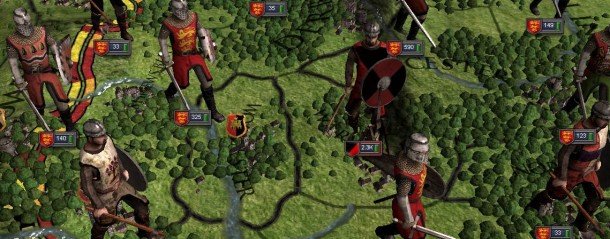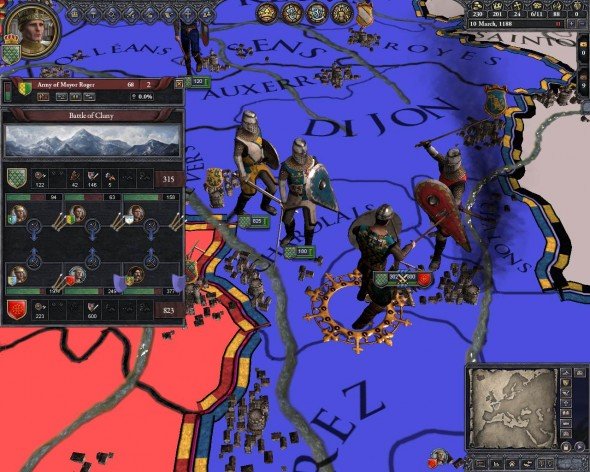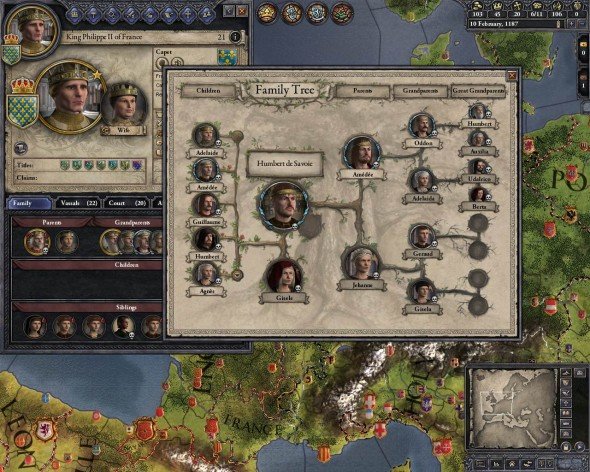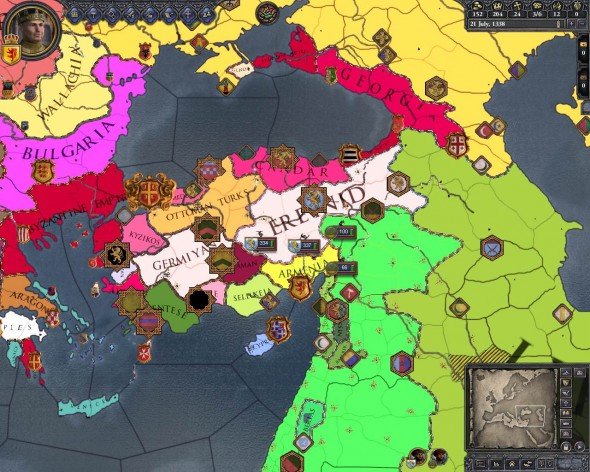
Loading Map Sprites... Loading Sounds... Loading Databases... Loading The Complete Works Of Shakespeare. That last message doesn't actually appear on Crusader Kings II's loading screen, but having just spent a day backstabbing dukes and undermining monarchs, I wouldn't arch an eyebrow if it did.
It's almost impossible to partake of this medieval RTS (Royal Tribulations Simulator) without finding yourself enmeshed in the kind of court plots and factional feuds that make The Bard's history plays such rattling good yarns. You might start out all sweetness and light, but before long you're bedding your brother's wife, Macbething your best friend, and doing a Richard the Third on your incarcerated nephews [Eww! – Cockney Ed].
One of the joys of all this unscripted knavery is just how simple it is to orchestrate. Compared to brain-strainers like Hearts of Iron III and Victoria II, CK2 is a petting zoo. Total War and Civ émigrés will need to cram for a couple of hours to get their heads round novel play priorities like heir production and plot engineering. Veterans of Sengoku and the first Crusader Kings can expect to be neckdeep in mesmerising medieval soap-opera much sooner.

Which isn't to say there aren't pitfalls awaiting the inexperienced. For my first foray I foolishly selected King Levon IV of Armenia as my avatar, and 1337 as my start date. I'd barely finished getting the measure of my courtiers, assigning duties to my five-person council, and marrying off my broody half-sister to a well-connected French oaf, when the first declaration of war arrived. Lesson #1. If you want to see your dynasty prosper, don't choose to play as the last Orthodox leader in the Middle East at a time when the region's most popular hobby was Poking Christians With Scimitars.
Things went a little more smoothly in my second game. Studying the handsome Europe-dominated strat map, I finally settled on the English West Country as a home. CK2 lets you don the doublet-andhose of anyone from a minor aristo to a kingdom-bossing monarch. Baldwin of Devon – my chosen nob – had but a single county to his name. However, with four healthy sons and William the Conqueror covering his back, he seemed perfect for some safe social climbing.
That climbing began slyly. My toad-like chancellor was despatched to Dorset to fabricate title claims. My darling wife and spymaster went west to Cornwall to spread foul rumours. Things were going like clockwork until the note arrived from Lady Rohese. “Would you like to rendezvous in my bedchamber?”

Seeing no profit in illicit rumpy-pumpy, I looked for the 'no' button. It wasn't there. Bug? I assumed so until I noticed the 'lusty' icon among my character traits. It wasn't dodgy code that was forcing my hand, it was hormones.
The biggest gaming news, reviews and hardware deals
Keep up to date with the most important stories and the best deals, as picked by the PC Gamer team.
After that unavoidable tryst, Baldwin's luck changed. Within a year the 36-year-old had quit Devon for Heaven (or possibly The Other Place). What took him wasn't clear (death descriptions could be a little more detailed sometimes). The consequences though, were impossible to miss. In an instant, control of the Brionne dynasty passed from the strong battlescarred hands of a grown man, to the small milk-white mitts of a six-year-old boy.
Choosing a regent for the infant Robert was easy. Albereda, his mother, took the reins. Over the next few years she used every instrument at her disposal to prevent the court from turning against the little lord. As she politicked, her brood played alongside Lady Rohese's oddly similar son. In May 1075, a deal was sealed that would, eventually, see Robert marry Agathe, one of King William's homelier daughters.

Albereda was a perfect mother, but even perfect mothers are powerless sometimes. Consumption consumed Robert a few weeks before his 16th birthday. He was laid to rest besides his father. The poisoned dynasty chalice passed to another Brionne boy barely strong enough to lift it.
It's at time like these that thoughts turn to CK2's fascinating succession options. Control of a realm doesn't have to pass from father to oldest son. There are seven different inheritance laws, each with their own pros and cons. A lord can, if canny, ensure power is handed to a loved sibling or trusted vassal rather than a craven son.
On the municipal and military fronts CK2 feels fleshier than Sengoku. There's more to build, more unit types in your automatically generated armies. I would like to have seen some additional tactical options, but watching the three elements of opposing armies (centre, left flank, right flank) clash via the 2D battle display, it isn't difficult to picture the martial mayhem. Total War-style scraps may actually have ended up diluting CK2's engrossing uniqueness. After all, a few franchises let you refight Henry V's most famous victories, but only one lets you murder his mum and inseminate his sisters,

